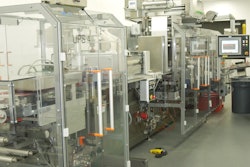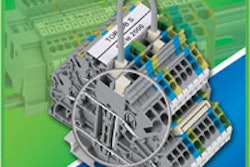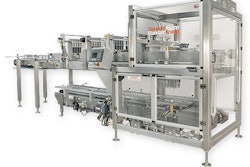Quick Response Manufacturing (QRM) is what every manufacturer dreams of. Here’s how one manufacturer of plastic parts and components, from disposable packaging to high-end medical parts for MRI equipment, is using QRM to achieve significant lead-time reduction.
It started in 2009, when Nicolet Plastics of Mountain, WI, observed that the major multi-national firms were increasingly moving their high volume, minimally complex molded business offshore to avoid rising costs at home. The company also observed that although the high-volume business was leaving, the low- to moderate-volume business was not. Management recognized the marketplace’s focus on long-run production optimization offered an untapped opportunity in the low- to moderate-volume market. To remain competitive, the firm elected to exploit its strength in excellence at complexity and turn market weaknesses into opportunities. It began looking for manufacturing philosophies that supported the needs of short-run, complex-part customers.
That is when Nicolet Plastics discovered a solution right in its own backyard. Quick Response Manufacturing is a consortium between the manufacturing industry and the engineering school at the University of Wisconsin. It was developed and published by founding director, Rajan Suri, who defines the program as the pursuit of the reduction of lead time in all aspects of a company’s operation, embracing a relentless emphasis on time reduction that has a long-term impact on every aspect of the company.
For Nicolet Plastics, the key to making the QRM program work was two-fold: Company-wide acceptance of operational change and the business and manufacturing tools found in EnterpriseIQ, a manufacturing ERP and MES system from IQMS. Before embarking on this new initiative, Nicolet Plastics established a few goals:
- Reduce total order to delivery time of parts by 14 days (from 21 days to 7 days)
- Reduce finished goods inventory
- Be able to respond to unexpected changes in demand without a degradation of service
- Develop a cross-trained workforce for flexibility, including the creation of a cross functional quick response office cell
- Reduce last shot (last good piece) to first shot time (first good piece) by 50 percent
Step one was to ignore job titles and employee categories by defining the talents and skills required for an ideal shift on the production floor. A skills matrix was built, including both soft skills (interpersonal, ability to succeed in a team environment) and hard skills (technical abilities, intelligence), including gaps between the target skills mix and the actual. With this thought process in mind, Nicolet Plastics immediately saw crossover. An employee previously defined as an operator might also be able to clean out a hopper, a skill that crossed over into materials handling. Once defined, Nicolet Plastics evaluated its employees in terms of skill levels through written and practical testing to determine competency levels and establish training necessary to create an ideal shift.
A credentialing program was established in house and employees were rewarded for technical abilities and willingness to learn new production and process-related skills. New pay ranges were defined for each skill level, so as employees progressed in their ability to handle more complex issues, value to the company increased and so did wages. To date, 120-plus hours per employee have been logged over a three year period, equivalent to a week of training for every employee since this initiative began.
Once the new employee roles were defined and established, Nicolet began tackling the individual QRM initiatives. The first was to change its accounting mindset: Because standard costing is not a key tenant of lean accounting, Nicolet Plastics decided to track actual costs instead. The challenge was to get employees thinking in terms of time and not in terms of overhead absorption. It is not reasonable to assume that all of a company’s costs will increase as production volume increases, but that is exactly what standard cost accounting assumes. Nicolet Plastics now tracks actual costs through the proactive tools in IQMS’ RealTime™ Process Monitoring system, as well as detailed exception reporting, for a proactive value add/value stream approach.
The second initiative was to reduce batch sizes. Due to the nature of low volume customers, Nicolet Plastics typically handles as many as 90 to 100 mold changes per week. QRM practices slicing time by sharing resources (in this case, presses) with competing target market segments (long and short runs) without creating backlogs and queues. In order to cut time, Nicolet Plastics schedules its long jobs that can run unattended over the weekend in what is referred to as a “swim lane.” This prevents short jobs from getting backlogged or delayed behind a long-running job (we all understand how frustrating it is to wait in the express lane behind someone at the grocery store who clearly has more than 10 items in his cart!).
Nicolet Plastics achieves this unattended lights-out weekend production with the help of IQMS’ RealTime™ Production Monitoring system that supports machine management in real time. All aspects of Nicolet Plastics’ production (total parts created, production time, downtime, rejects and parts remaining) are tracked immediately and applied to the order, while simultaneously updating the schedule. Work center performance can be viewed from any computer on the network and even remotely, for improved efficiency, visibility, and productivity.
If RealTime detects that there is a problem with an unattended swim lane, like a press has stopped running, Nicolet Plastics uses the EnterpriseIQ business activity monitoring feature, IQAlert, to generate an automated message (text, email or voice message) to the on-call press technician. The technician only needs to come to work if an exception occurs.
With the critical component of properly handling customers’ needs top of mind, Nicolet Plastics next focused on managing job complexity. Nicolet Plastics was previously supporting hundreds of different materials and thousands of mold/insert combinations. Variability is the essence of complexity, so Nicolet Plastics had to focus on eliminating dysfunctional variability, such as excessive inventory, ineffective systems and rework. Using the rich data in EnterpriseIQ, Nicolet Plastics evaluated the top 80 percent of
its customers, items and materials to identify target groups. The tools in EnterpriseIQ allowed Nicolet Plastics to “weed the garden” (eliminate non-strategic variability) and come up with a resulting mix that remains very complex, but more focused.
Following the initiative above, Nicolet Plastics addressed its wide variety of custom resins and materials required to run jobs, specifically the challenge: How do you reduce lead times when the material lead time may be longer than your total desired time for the whole order? Using its new data about key materials from the step above, Nicolet Plastics was able to designate “house” materials. Using EnterpriseIQ’s user-defined fields and rich MRP reporting tools, Nicolet Plastics identified daily usage, appropriate reorder points while establishing a purchasing plan to ensure sufficient stocks of key house materials.
With staff, materials and batch size improvements addressed, Nicolet Plastics could focus on scheduling. QRM requires dynamic and fluid adaptation at any minute, so Nicolet’s master scheduler uses EnterpriseIQ’s rough-cut capacity planning tools and robust scheduling engine (that takes into account complete materials, capacity and labor requirements in a matter of minutes) to create the daily plan.
Nicolet also uses EnterpriseIQ’s auto-load feature that uses must-start dates to establish a priority sequence for jobs. If a job has a must-start date in the next seven days, it is authorized for work. This prevents “stealing” of necessary materials or labor from one job for another that is not yet due. Combine this with just-in-time principals and Nicolet Plastics can easily see where there will be spikes and constraints to manage.
Despite the accurate schedule, Nicolet Plastics needed additional flexibility. So in combination with the auto-loaded schedule, Nicolet Plastics uses EnterpriseIQ’s press and labor capacity whiteboards to ensure they have spare capacity for flexibility. In addition, Nicolet Plastics uses EnterpriseIQ’s Runs Best feature (an establishment of which job runs best on which work center) to define which presses are capable and qualified to run any item. This is also included on the schedule to offer operators the flexibility to adjust as needed to prevent potential bottlenecks and flow resources where needed.
Finally, Nicolet Plastics moved its focus from the production floor to the front office to make sure that customer service was also done the QRM way. All support staff that touched an order were organized into one team and cross-trained to improve responsiveness to customers. Nicolet Plastics uses EnterpriseIQ’s customer relationship management (CRM) system to extensively track customer and order status. With the ability to accurately check capable to promise, to access external documents, and to initiate workflows to facilitate communication, Nicolet Plastics’ employees can quickly and easily asses what has transpired, the particular status of an order, etc. for accurate and timely customer service.
Time is money in manufacturing. A quicker responsiveness to the customer gives them not only what they want, when they want it, but at quantities that allow them to lower inventories and improve cash flow. Despite the benefits of time-based competition and make to order strategies, injection molding has been very slow to adopt a time-based model.
QRM has clearly differentiated Nicolet Plastics from other molders. Nicolet Plastics has added many clients because it has been able to develop partnerships based on the value it delivers, not the price it charges. By saving its customers an invaluable week of time in production, Nicolet Plastics’ clients can get projects to market faster and gain market share ahead of the competition.
In addition to the new business, Nicolet Plastics has achieved:
- Improved velocity: 2.3 times at the start of the project to an estimated velocity of 6.3 times for 2012. The financial results - margins, cash flow and revenue - have all followed.
- A reduction of total finished goods inventory from a high of $500,000 in 2008 to an average of $200,000 in 2012 (while doubling total sales).
- Increased finished goods inventory turns from 11 to 25.
- Reduced lead time by seven days (halfway to goal).
- Reduced time spent making scrap parts (scrap hours) by 45 percent in the first year.
- An improved working capital position (from lower inventory) has enabled debt pay-down.
- 2010 was the best year in the company’s history from an income standpoint. 2012 will be the best year in company history, both in terms of revenue and earnings.
But the most impressive return on investment realized by Nicolet Plastics is its earnings before interest, taxes, depreciation and amortization (EBITDA). With sales doubling since 2009, Nicolet Plastics’ EBITDA has quadrupled in 2010 through 2012 over the same three year period and will exceed EBITDA for the preceding 10 years combined!
Nicolet Plastics’ significant and forward-focused achievements since the project began have garnered attention throughout the manufacturing industry: Nicolet Plastics has been honored with a Manufacturing Leadership (ML) 100 award for Operational Excellence, was the recipient of the Workplace Excellence Award from the New North and was a finalist in two categories—Workplace Development and Manufacturing Excellence–for the Wisconsin Manufacturer of the Year award. Despite these accomplishments, quick response manufacturing is a journey and Nicolet Plastics is happy to say that it is not done yet


























